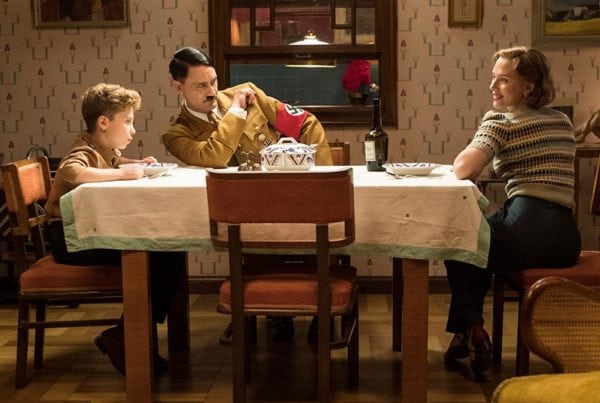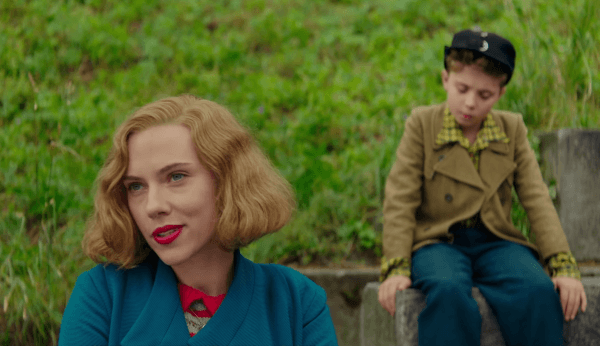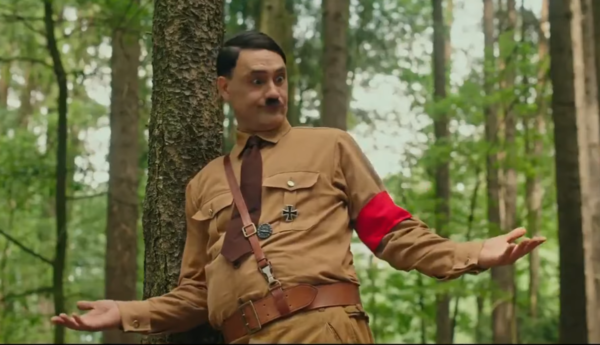Jojo Rabbit, 2019.
Directed by Taika Waititi.
Starring Roman Griffin Davis, Thomasin McKenzie, Scarlett Johansson, Sam Rockwell, Alfie Allen, Rebel Wilson, Stephen Merchant, Archie Yates, and Taika Waititi.
SYNOPSIS:
Jojo (Roman Griffin Davis) is an enthusiastic member of Hitler’s army, so-much-so that his imaginary best friend is a manifestation of the Nazi leader (Taika Waititi). When he finds a Jewish girl (Thomasin McKenzie) hiding out in his home, Jojo challenges his misplaced idealogy in the face of this new friendship.

Jojo Rabbit was always going to be an intriguing proposition, even before we knew it was a comedy prominently featuring a representation of the most evil man in the history of the world, largely for laughs. It’s Taika Waititi’s first film since the kaleidoscopic brilliance of Thor: Ragnarok, one which gave a director previously know for independent masterpieces, Hunt for the Wilderpeople and Boy, a larger platform upon which to weave his unique brand of storytelling.
If there was any pressure, then it doesn’t show, because Jojo Rabbit survives a scattershot opening twenty-minutes to evolve into something really rather magical. The kind of joy-infused film that the world it’s born into really needs right now.
Much like the film does, let’s address the Nazi sized elephant in the room early on in the piece. Introduced as a kind of Butlins for buffoons, the arbiters of evil are there to be ridiculed from the off, running their training camp with a comedic level of ineptitude. However, don’t for one minute think that Waititi doesn’t present them as a viable threat. There are moments in Jojo Rabbit that are underpinned with a tension and level of fear that you might not have expected after the Moonrise Kingdom invoking light-heartedness of the opening. There is a single moment which centres around a pair of shoes, that is amongst the most heartbreakingly cruel shots imaginable.
Anyone familiar with Waititi’s work will know that everything pumps from a big-beating heart, so if you thought the hug between Ricky and Hec was a giant gut-punch in Hunt for the Wilderpeople, know that you’ll be carrying so much more from Jojo Rabbit than whimsy and Hitler gags. There’s a heavy weight of sadness that’ll need supporting by the end-credit spring-in-your-step.
Much of this heartache and joy can be traced to the actors. Great performances from kids appears to be one of Waititi’s strengths, with Roman Griffin Davis really delivering when the emotional stakes are cranked up. Although he’s nearly outdone by the sweet innocence of Archie Yates as Yorki, who perfectly captures the fallacy of war with his wide-eyed innocence. Aside from the director himself, the showy roles go to Stephen Merchant, who turns up to be at once creepy, and also uncomfortably funny in an extended cameo, and Sam Rockwell, who plays an eccentric SS officer who’s hiding more than just doubts.
However, Jojo Rabbit belongs to two outstanding performances from Scarlett Johansson and Thomasin McKenzie. The former is quietly devastating as a mother-cum-resistance fighter. The scene in which she role-plays as Jojo’s absent father, using shoe polish for a beard, dancing with herself in a melancholy display of strength, is the stuff of stained tears and show-reels. And then there’s McKenzie, the Leave No Trace actor instantly sobering the movie with her very presence, one which grows into something quite remarkable and inspiring, all punctuated by a memorable David Bowie needle-drop during the finale.

In fact, this is a movie of multiple indelible moments. Some, such as Yorki accidently firing off a rocket-launcher, will tickle the funny-bone, but others, like those in which Jojo and McKenzie’s Elsa share war correspondence, will bother the tear-ducts. What Waititi manages to do expertly is weave this into a cohesive, propulsive anti-hate message-movie.
Jojo Rabbit clearly won’t be to everyone’s liking, but those who can’t look past any perceived bad-taste garnered from the synopsis, are in danger of missing out on a film that’s something of an antidote to the woes found outside of the four corners of a cinema screen. It’s the kind of joyous escapism cinema was made for.
Flickering Myth Rating – Film ★ ★ ★ ★/ Movie ★ ★ ★ ★
Matt Rodgers – Follow me on Twitter @mainstreammatt












